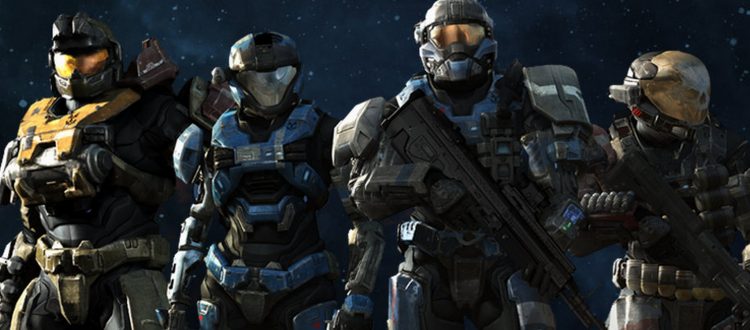On Bouncing Off Halo Reach; or, A Situational Change Protagonist Synthesis
Halo Reach holds a hallowed place in my personal gaming history. Not only does it dwell among the few games that have earned more than one hundred hours of my attention, it became a locus around which casual friendships evolved into something greater. For three years, myself and three others gave over Thursday nights to failing spectacularly at Halo Reach’s multiplayer. It was never about winning. It was a 21st century analogue to the bowling league. Kill/death ratios were never as essential as the time set aside to complain about careers, argue over trifles, and otherwise catch up life. The politics of the game, such as the Master Chief as an icon for turning colonial adventures into something ubiquitous and anonymous while simultaneously identifiable, were a tertiary consideration to having fun with my friends.
This past Thursday myself and those same chums jumped into the Master Chief Edition of Halo Reach. We played through the first few acts of the story’s campaign and marveled at nostalgia in 60 FPS. That’s about when the Spartans of Noble Squad started hand wringing, and gun pointing, at the vaguely Middle Eastern, but more likely Eastern European residents of the planet Reach. Were they members of the Insurrection – the galaxy spanning resistance movement against the United Nations Space Command?
“Oh yeah,” one of my friends said. “We’re sort of the bad guys here, aren’t we?”
“I mean the Covenant are supposed to be the bad guys, but the only reason the Spartans were made was because the UNSC wanted a superior special ops soldier that would be able to put down the Insurrection.”
The first generation of Spartans were child soldiers raised to be perfect weapons. Within the game’s lore, the UNSC took six-year-olds from their respective homes, replaced them with flash clones – which would proceed to die rather quickly, thus traumatizing the fuck out of a lot of parents – and began the process of genetic and cybernetic augmentations that would lead to the Spartan program. The Covenant invasion of the UNSC was, in the words of Bob Ross, a happy accident that shifted Spartan deployment plans from hunting down anti-establishment types to being the tip of humanity’s spear against an alien invasion.
Is there more eloquent proof of this particular power fantasy as a hell of a drug than the elevation of Master Chief to video game divinity, despite this origin? And while I may have parked my ass in the pews of the First Reformed Church of the Pillar of Autumn and Our Lady of Azure Salvation for a number of years, I don’t think it works for me anymore.
This is not meant to be a Destiny vs Halo pissing contest, though the comparison will serve as a convenient juxtaposition for the sake of this argument. Every FPS asks its audience for a certain amount of compromise between who they are, as the player, and the mantle they assume as the player character.
Wolfenstein invites synthesis with B.J. Blazkowicz, who would very much like you to collect some Nazi scalps.
Doom invites synthesis with the Doom Slayer, who would very much like you to slay Hell’s unending hordes, who are also stand-ins for corporate greed and incompetence.
Destiny invites synthesis with one’s self: become the hero the world needs and deserves.
Halo invites synthesis with the Master Chief (or an unnamed ODST – orbital drop shock trooper – or Noble 6, depending on the game), who is going to have to get back to the business of killing people who disagree with the government once these aliens are dealt with.
And that’s why I can’t go home again to Halo: Reach. Absent an alien threat, the UNSC are the bad guys in a game franchise whose marketing, particularly around Halo 3, was not shy in lionizing military adventures with all the aplomb of a Ken Burns documentary. All of those interviews with old guys portraying veterans of the UNSC-Covenant war remain evocative more than a decade later. I’d say they border on a recipe for manufacturing real world propaganda if one were to start really deconstructing things.
This isn’t to say that the story of Halo Reach, itself, should be ignored, or that potential newcomers to Halo should steer clear. Amid the trappings of a pew-pew experience, there is a considerable amount to unpack and enjoy in the Halo series. But on the question of play, of choosing to give my time to something, I don’t think I can go back to 2010.
It was a hell of a ride while it lasted, but the time has come to move on.









